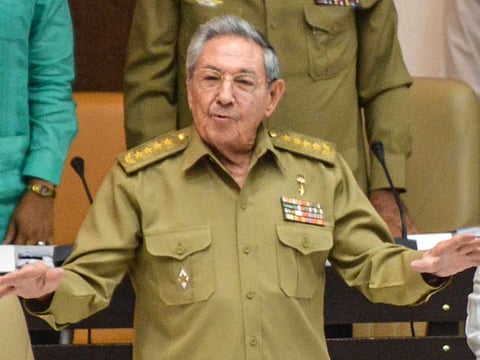Trump may reset US-Cuba policy
The government in Havana could respond by taking advantage of the newfound antagonism by clamping down on the pockets of independence

United States President Donald Trump, with Senator Marco Rubio of Florida, is set to announce a presidential initiative that will roll back the Barack Obama-era efforts that had loosened the 56-year-old US embargo on Cuba. Now the question is: How far will the president go?
More important than the actual content of the executive changes, though, will be how the US Congress, businesses and other interest groups react to Trump’s reversal of policies that, according to Pew Research Center, 75 per cent of Americans support.
Key, too, will be the reaction of the Cuban government. For the past half-century, the gerontocratic Cuban regime has survived because the embargo has not just isolated the Cuban people from their closest neighbour of more than 300 million — including close to two million fellow Cubans — but also provided a convenient excuse for the regime’s economic failure.
Despite the assertions of its advocates, the embargo’s harshness has never correlated with improvements in human rights. The worst crackdown in modern Cuban history was in April 2003, when the Cuban government rounded up 75 human rights activists and independent journalists and sentenced them to an average of 20 years in prison. That was precisely when the embargo was at its tightest, under George W. Bush’s administration, when even Cuban-Americans were restricted in how often they could travel to the island to visit relatives or send them money. (Most political prisoners were released in 2010-11 through a deal brokered by the Vatican.)
What the US lacked then but has now is leverage. Since Obama announced the first in a series of dramatic reforms on December 17, 2014, to normalise relations, the US and Cuba have collaborated on fighting narcotics trafficking and money laundering, cooperated on improving port and airport security, and managed to secure visits from officials like the United Nations special rapporteur on human trafficking.
The changes have also helped generate jobs and income for the US economy. Since Obama loosened restrictions on travel, tourism has boomed. Last year, an estimated four million visitors went to the island, including more than 600,000 from the US — a 34 per cent increase from 2015. Those trips have helped fuel the hospitality industry on both sides of the Florida Straits, with Delta, American, JetBlue and others flying to at least six Cuban cities daily and Carnival cruise lines taking American citizens to port in Havana. Airbnb also now lists hundreds of privately-owned houses where open-minded Americans can stay and interact with locals, and last week it said its connections have helped place $40 million (Dh147.12 million) in the pockets of Cuban owners of private bed-and-breakfasts. All told, the group Engage Cuba estimates (in a report that I took part in) that restricting the rights of US citizens to travel and invest in Cuba would cost the American economy $6.6 billion and affect 12,295 American jobs.
The government of President Raul Castro gains monetary benefit from the increased flow of tourism to the island, but it has resisted the opening that comes with it. It no longer incarcerates political prisoners at the same rate as it did before. Instead, its new tactic is temporarily detaining activists. But the dam has broken. When I was in Cuba last year, the differences in people’s willingness to speak out, the growing prosperity of a new class of independent entrepreneurs and — as the Committee to Protect Journalists has also reported — the growth of new space for independent, investigative online journalism was undeniable compared with the situation four years earlier. It’s for this reason that international human rights advocates support loosening the embargo.
Before heading to Miami, Trump will need to weigh his options carefully. He wasn’t elected by a small sliver of the Cuban-American population in Florida, and his actions would allow the government in Havana to use the rollback as an excuse to stay stuck in the Cold War.
Yes, the embargo remains law, and Trump can wipe away the Obama-era changes with a stroke of the pen. But Congress isn’t powerless in this. Last month, a bipartisan group of 55 senators signed an act to end restrictions on US travel to Cuba. Should Trump dramatically roll back the initiatives, the universities that have enjoyed the academic freedom of exchange, businesses and their workers, and the millions of citizens who have travelled to the island and connected with Cuban communities need to speak up. They need to demand that existing policy serves America’s long-term interests and promotes the values of openness and confidence in freedom and change — and thus ultimately serves human rights.
The Cuban government will need to avoid overreacting to the overheated rhetoric and denunciations that will accompany the changes. But it is not likely to be able to resist. If history is any measure, the Cuban government will respond by taking advantage of the newfound antagonism — as it did in 2003 — by clamping down on the pockets of independence and information that have taken seed in the past four years. After all, what autocrat can resist being a victim and blaming outsiders for political and economic failures?
— New York Times News Service
Christopher Sabatini is a lecturer at Columbia University’s School of International and Public Affairs and the director of Global Americans.


